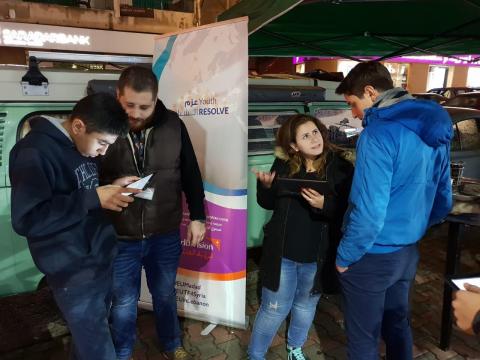A city for youth is a city for everyone

Beirut, the biggest and capital city of Lebanon, has been affected, like other parts of the country, with a high number of refugees fleeing the war in Syria. The majority of Syrian refugees in Lebanon live, out-of-camps, in neighborhoods they can afford: mostly impoverished and marginalized ones. World Vision has a history of working in Beirut. Its presence in the city before this latest crisis and the partnerships the organization built with city residents and local urban actors, including local governments, made it easier to extend its work to benefit refugees in addition to host communities.
Since its establishment, the World Vision office in Beirut has taken on a focus on youth in poor and marginalized neighborhoods within and on the periphery of the city. The Beirut team greatly believes in the power of youth to be agents of change in their neighborhoods, city and society at large. Therefore, the Beirut program is investing in building their skills, particularly related to local level advocacy, to empower them to improve their communities.
One form of engagement has been creating the Youth Municipal Councils, youth groups that shadow the work of three municipalities in Greater Beirut. Through the use of creative and interactive methods for data collection, the Youth Municipal Councils were able to assess issues that affect up to 3,000 young people in the three areas. Their methods included using a digital platform created for this initiative “Youth in the cities”, deploying a customized colorful van to be parked in different locations across the neighborhoods in the three areas over the period of 12 days to engage directly with youth in the streets, offering hot beverages and snacks and a pop-up seating area with Wi-Fi connection and tablets to complete the surveys as well as working with local influencers, local municipalities and businesses to spread the survey link through their social media channels. In one of the neighborhoods, 12 female local police members offered to market the data collection process by distributing leaflets during their working hours. This process was inclusive of Lebanese, Syrians, Iraqis and others living in the neighborhoods adapting an area-based approach rather than focusing on needs of specific groups. Safety and public space were identified as main priority areas in addition to youth engagement, (public) transit and clean environment.
Through local level advocacy skills gained by being involved in World Vision’s program, the Youth Municipal Councils developed solutions and reached out to the local municipalities in their neighborhoods to get their support. In one of the neighborhoods, the youth group successfully advocated with the municipality to match funding for setting up playgrounds in an unused space. This same group is currently advocating with the municipality to ensure access of Syrian refugees to these playgrounds is granted. This is an important issue in the highly contested environment in the city. Ensuring municipal support to such initiatives is a step forward to building social cohesion between urban residents and ensuring sustainability of efforts.
Engaging urban youth in fun and meaningful ways has potential for empowering them, equipping them to be better citizens and to care for their local environment. After all, with shrinking space in the city and houses becoming smaller, streets become the living room, the space to connect, dialogue and relax. Who’s better than youth in understanding what their neighborhoods and streets need and who has more resolve than them to hold their local authorities accountable?